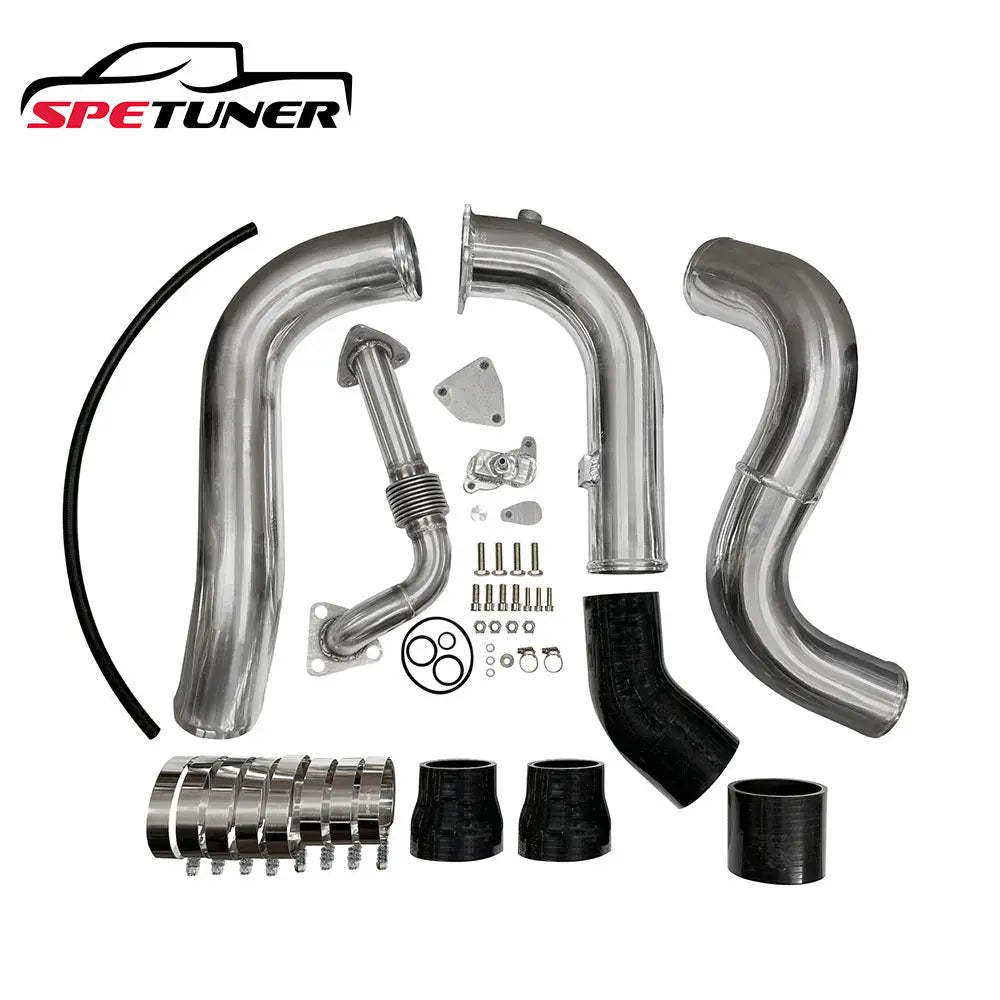One of the most common concerns diesel truck owners have: Will EGR delete cause black smoke? The answer is NO: a properly executed EGR delete with correct tuning should NOT cause black smoke. However, an improperly done EGR delete or one without appropriate tuning can indeed result in black smoke issues. Let's explore why this happens and how to prevent it.
Black Smoke in Diesel Engines
Before addressing EGR deletes specifically, it's important to understand what causes black smoke in diesel engines. Black smoke is the result of incomplete fuel combustion, which occurs when:
- Too much fuel is injected relative to available oxygen
- Insufficient air enters the combustion chamber
- Poor atomization of fuel prevents proper mixing with air
- Incorrect injection timing doesn't allow adequate combustion time
- Low combustion temperatures prevent complete fuel burning
The black smoke you see is essentially unburned carbon particles (soot) being expelled through the exhaust. This represents wasted fuel, reduced efficiency, and potential engine damage over time.
How EGR Delete Affects Smoke Production
In theory, an EGR delete should actually reduce the tendency for black smoke, not increase it. Here's why:
Cleaner Air Intake: With the EGR system removed, your engine receives 100% fresh, oxygen-rich air instead of a mixture of fresh air and exhaust gases. More oxygen means better fuel combustion and less soot formation.
Lower Intake Temperatures: EGR systems introduce hot exhaust gases back into the intake, raising intake air temperatures. Cooler, denser air from an EGR delete contains more oxygen molecules per volume, improving combustion efficiency.
Reduced Carbon Buildup: EGR systems are notorious for causing carbon deposits in intake manifolds and valves. These deposits can disrupt airflow and combustion patterns. An EGR delete eliminates this ongoing contamination.
Why Some EGR Deletes Cause Black Smoke
Despite the theoretical benefits, many diesel owners report increased black smoke after an EGR delete. This happens for several specific reasons:
No Tune or Incorrect Tune: This is the number one cause of black smoke after EGR delete. Without proper ECU recalibration, your engine may run too rich (too much fuel for the available air), resulting in incomplete combustion and black smoke.
Aggressive Performance Tunes: Some tuners prioritize maximum power output over clean burning. These "smoke tunes" intentionally over-fuel the engine for dramatic power gains, resulting in heavy smoke—especially under acceleration.
Cheap or Poorly Designed Tunes: Low-quality tunes may not properly adjust fuel delivery, injection timing, and boost pressure to match the new airflow characteristics after EGR removal.
Other Existing Issues: An EGR delete may expose pre-existing problems like worn injectors, turbo issues, or air intake restrictions that were partially masked by the EGR system.
Proper EGR Delete Should NOT Cause Black Smoke
When executed correctly with quality components and professional tuning, an EGR delete should result in cleaner exhaust with little to no visible smoke under normal driving conditions. Here's what a proper setup includes:
Quality Delete Components
- Complete EGR block-off plates: Properly sealed to prevent exhaust leaks
- EGR cooler bypass or removal: Eliminates the entire recirculation pathway
- Intake manifold cleaning: Removes existing carbon buildup before installation
- New gaskets and hardware: Ensures leak-free operation
Check Spetuner quality delete kits for egr system below:

EGR Delete Kits — Shop by Engine (Powerstroke / Cummins / Duramax)
EGR delete kit
$398.00 USD
Buy NowProfessional ECU Tuning
The tune must address several critical parameters:
- Fuel injection quantities: Adjusted for increased oxygen availability
- Injection timing: Optimized for clean combustion without EGR
- Turbo boost pressure: Recalibrated for proper air delivery
- Air-fuel ratio targets: Set to ensure complete combustion
- Exhaust gas temperature limits: Programmed to prevent damage
- Rail pressure settings: Adjusted for optimal fuel atomization
Supporting Modifications
For best results, consider complementary upgrades:
- High-flow air filter: Ensures adequate air supply
- Upgraded intercooler: Keeps intake temperatures low
- Free-flowing exhaust: Reduces back pressure
- Quality fuel: Premium diesel promotes cleaner combustion
The Role of Tuning in Preventing Black Smoke
The tune is absolutely critical in determining whether your EGR delete produces black smoke. Different tuning philosophies produce vastly different results:
Clean Tunes vs. Smoke Tunes
Clean/Emissions-Friendly Tunes: These prioritize efficient combustion with minimal visible smoke. They adjust fuel delivery to match the improved air intake, resulting in more power without excessive fueling. This is what you want for daily driving and longevity.
Performance/Smoke Tunes: These intentionally over-fuel the engine for maximum power output. The trade-off is heavy black smoke, reduced fuel economy, and increased engine wear. While dramatic, these tunes are generally only appropriate for competition vehicles.
Custom Tuning vs. Off-the-Shelf
Custom dyno tuning typically produces the cleanest results because the tuner can precisely adjust parameters while monitoring real-time combustion quality, exhaust temperatures, and smoke production.
Canned tunes vary widely in quality. Reputable tuning companies offer clean-burning off-the-shelf options, but some bargain tunes may produce excessive smoke.
Diagnosing Black Smoke After EGR Delete
If you're experiencing black smoke after an EGR delete, here's how to identify the cause:
When Does the Smoke Occur?
Only During Hard Acceleration: This usually indicates an overly aggressive tune or the turbo can't supply enough air for the fuel being injected. A light haze under load is normal; heavy rolling coal is not.
At Idle or Light Throttle: This suggests a serious tuning problem, possibly too much fuel being delivered even at low engine loads. This is not normal and needs immediate attention.
Constantly: Indicates major issues—either severe tuning problems or mechanical failures like damaged injectors or turbocharger problems.
Other Symptoms to Check
- Poor fuel economy: Suggests over-fueling
- Loss of power: May indicate boost or air intake issues
- High EGTs: Often accompany black smoke from incomplete combustion
- Rough running: Indicates improper fuel delivery or timing
- Check engine lights: May point to sensor or system faults
Solutions for Black Smoke After EGR Delete
If You Haven't Tuned Yet
Get a proper tune immediately. Driving with an EGR delete and no tune is the primary cause of black smoke issues. Invest in quality tuning from a reputable company experienced with your vehicle make and model.
If You Already Have a Tune
Contact your tuner: Most reputable tuning companies will revise tunes if you're experiencing smoke issues. They may need to adjust fueling rates, timing, or boost parameters.
Consider a different tuner: If your current tuner can't resolve the issue, you may need to switch to a company known for clean-burning tunes.
Select a different power level: Many tuners offer multiple tune levels (economy, towing, performance). A lower power level may burn cleaner while still providing benefits over stock.
Check for Mechanical Issues
Black smoke isn't always tuning-related. Inspect these components:
- Fuel injectors: Worn or damaged injectors don't atomize fuel properly
- Turbocharger: Boost leaks or turbo damage reduce the air supply
- Air filter: A clogged filter restricts airflow
- Intercooler: Leaks or damage reduce air density
- Exhaust restrictions: Clogged DPF (if present) or damaged exhaust
- Intake manifold: Heavy carbon buildup disrupts airflow
Comparing EGR Delete to Stock Configuration
Stock with Functioning EGR
- Minimal visible smoke under most conditions
- May produce light gray smoke under heavy load
- Gradual carbon buildup in the intake system
- Emissions compliant (for on-road use)
Properly Tuned EGR Delete
- Little to no visible smoke during normal driving
- Possible light haze under maximum acceleration
- Cleaner intake system over time
- Better throttle response and power
- NOT emissions compliant for on-road vehicles
Poorly Executed EGR Delete
- Heavy black smoke under acceleration
- Possible smoke at idle or cruise
- Poor fuel economy
- Potential engine damage
- Check engine lights and codes
Best Practices for Smoke-Free EGR Delete
To ensure your EGR delete doesn't cause black smoke issues:
Pre-Installation
- Research thoroughly: Understand legal implications and requirements
- Choose quality parts: Don't cheap out on delete components
- Select a reputable tuner: Read reviews, ask for references
- Verify your vehicle's condition: Address any existing issues first
- Clean intake system: Remove carbon deposits before installation
During Installation
- Follow manufacturer instructions: Proper installation prevents leaks
- Use quality gaskets: Ensure complete sealing
- Check for vacuum leaks: Verify all connections are secure
- Install supporting mods: Consider air intake and exhaust upgrades
Post-Installation
- Apply tune immediately: Never drive without tuning
- Start with conservative settings: Use economy or towing tunes initially
- Monitor performance: Watch EGTs, boost pressure, fuel consumption
- Log any issues: Document smoke conditions for tuner feedback
- Get dyno testing: Verify optimal performance and clean operation
What Smoke Condition After an EGR Delete?
What should you realistically expect regarding smoke after a properly executed EGR delete?
Normal Conditions (Properly Tuned)
- Cold starts: Minimal white smoke that clears quickly (normal for diesels)
- Idle and cruise: No visible smoke
- Light acceleration: No smoke or barely perceptible haze
- Hard acceleration: Brief light gray haze that clears immediately
- Full throttle/high load: Light to moderate gray smoke that's not excessive
Warning Signs (Problems Present)
- Heavy black smoke at any throttle position
- Continuous smoke during cruise or idle
- Smoke that lingers after acceleration
- Smoke accompanied by poor performance
- Smoke with unusual odors (burning oil, unburned fuel)
💨 Keeping Your Engine Smoke-Free
After achieving clean operation post-EGR delete, maintain it with:
- Regular maintenance: Oil changes, air filter replacement, fuel filter changes
- Quality fuel: Use premium diesel from reputable stations
- Fuel additives: Consider cetane boosters and injector cleaners
- Monitor boost system: Check for boost leaks periodically
- Inspect intake: Verify intake plumbing remains sealed and clean
- Address issues promptly: Don't ignore new smoke or performance changes
Will EGR Delete Cause Black Smoke?
No—a properly executed EGR delete with correct tuning should NOT cause black smoke. In fact, it should improve combustion efficiency and reduce smoke compared to a failing or carbon-clogged EGR system.
However, black smoke WILL occur if:
- No tune is applied after the delete
- A poor-quality or overly aggressive tune is used
- Mechanical issues exist (bad injectors, turbo problems, etc.)
- The installation was done incorrectly
- The tune is intentionally configured for "rolling coal."
The key to a successful, smoke-free EGR delete is investing in quality components, professional installation, and proper ECU tuning from a reputable source. Cut corners on any of these elements, and black smoke becomes highly likely.
Need a clean off-road tune after your EGR delete? Check proven options here: Mini Maxx Tuner V1 or Mini Maxx Tuner V2 (bundle).







